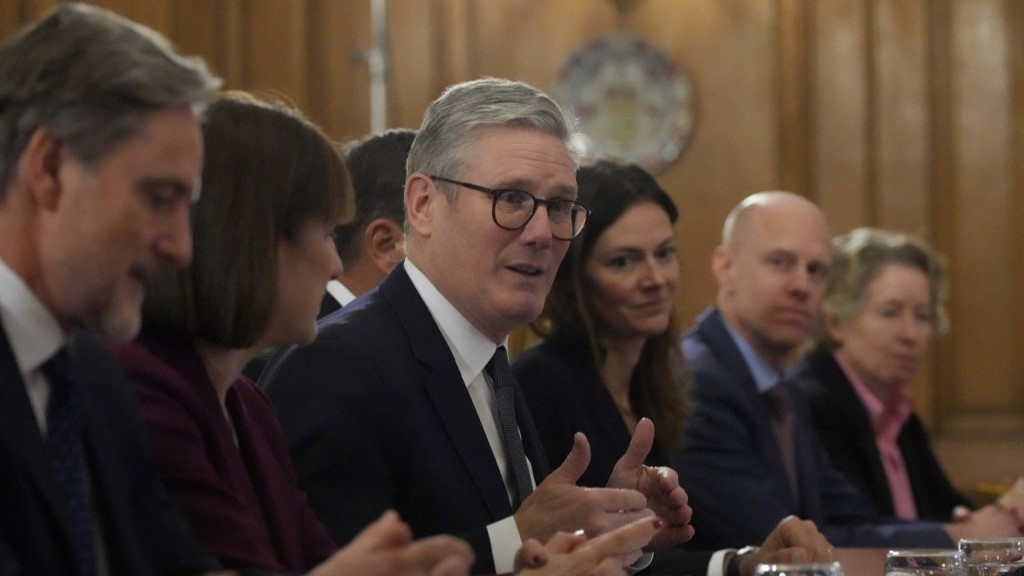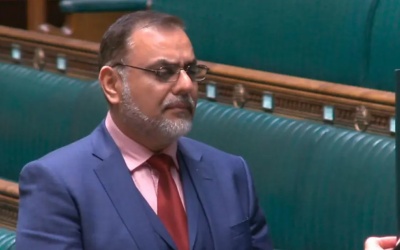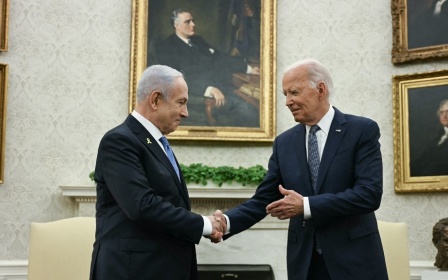UK suggests it would comply with ICC warrant and arrest Netanyahu

The British government has said it will comply with its obligations under domestic and international law after the International Criminal Court (ICC) issued arrest warrants for Israeli Prime Minister Benjamin Netanyahu and his former defence minister.
On Thursday, the government refused to confirm whether Netanyahu would be arrested if he set foot on British soil.
On Friday afternoon, however, PA Media reported Prime Minister Keir Starmer's spokesperson as saying: "The UK will always comply with its legal obligations as set out by domestic law and indeed international law."
He added: "I’m not going to get ahead of the process or provide commentary on individual cases."
Husam Zomlot, the Palestinian ambassador to the UK, told Middle East Eye: "We welcome the announcement by the UK government that the UK supports and respects the independence of the ICC and would comply with the Netanyahu government arrest warrants.
New MEE newsletter: Jerusalem Dispatch
Sign up to get the latest insights and analysis on Israel-Palestine, alongside Turkey Unpacked and other MEE newsletters
"All member states of the ICC have clearly mandated obligations," Zumlot added.
"It's a clear mandated obligation to uphold and preserve international law."
As a member state of the ICC, Britain would be obligated to arrest Netanyahu if he entered the country, legal experts and commentators have told Middle East Eye.
In 2001, Tony Blair's Labour government passed the ICC Act, which enforces compliance with the court.
There is a domestic legal process through which Britain's independent courts determine whether to endorse the warrant in accordance with the 2001 act.
The prime minister's spokesperson appeared to refer to this process in his statement. However, by saying Britain would comply with international law, he appeared to signal that the UK backs the ICC.
This is consistent with the Labour government's previous statements in support of the ICC.
In July, Britain dropped its previous objection to an arrest warrant being issued, which was filed by the previous Conservative government.
The Labour government said: "This is a matter for the court to decide on."
'We respect the court, its independence'
The government continues to refuse to say explicitly whether it will comply with the arrest warrant. On Friday morning, Yvette Cooper, the home secretary, declined to comment on the issue.
"The International Criminal Court is obviously independent. We respect the court, its independence, and we are clear of its role, which is different from the UK government’s role," she said.
"The vast majority of International Criminal Court cases do not become a matter for the UK legal processes, law enforcement processes or for the UK government," she added.
"In the event that they ever do, there are both proper legal processes that have to be followed and also proper government processes that have to be followed - and foreign office processes that have to be followed."
Palestinian ambassador Husam Zomlot told MEE: "Supporting the independence of the ICC is the floor, not the ceiling, of the UK's responsibilities as a member state, let alone its historic responsibility on the plight of the Palestinian people.
"And adherence to international law cannot be selective and must not be politicised," he added.
"This also includes adhering to the ICJ advisory opinion whereby all dealings with any organisation, competent individual or body that support Israel's illegal practices in occupied territory must cease immediately."
Campaigners and opposition politicians have called on the government to go further and cease trade relations with Israel.
Independent MP Ayoub Khan told MEE on Thursday that Britain must immediately halt all assistance to the Israeli government, including the sharing of intelligence from British surveillance flights over Gaza.
Green Party co-leader Carla Denyer said the warrants "make clear that to continue selling arms to Israel is to aid and abet war crimes".
By contrast, the opposition Conservative Party has slammed the ICC, with Shadow Foreign Secretary Priti Patel calling its decision "deeply concerning and provocative".
Middle East Eye delivers independent and unrivalled coverage and analysis of the Middle East, North Africa and beyond. To learn more about republishing this content and the associated fees, please fill out this form. More about MEE can be found here.





